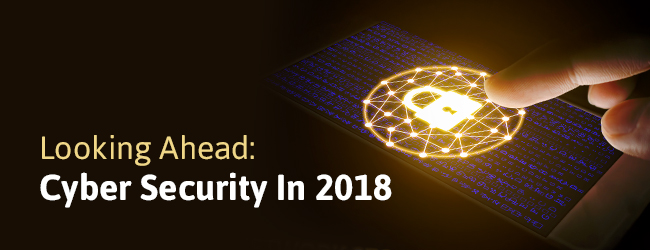2017 was a pretty rough year in terms of cybersecurity: ransomware, state-sponsored attacks, phishing scams, and big companies (like Equifax) failing to stick to security best practices (like implementing two-factor authentication) and therefore falling victims to cyber attacks. So what does 2019 has in store for us? Let’s take a look at some of the 2019 predictions being made by cybersecurity community.

1. AI-Powered Attacks: Security experts have been predicting AI-powered attacks for a long time now. And 2019 might just be the year they materialize. The benefits of Artificial Intelligence powered software are plenty. Therefore it’s just a matter of time before the hacking community finds out a way of using them for their own benefit. Some examples include:
- Spamming or Phishing Using Chat Bots: Gathering intelligence is quite important when it comes to multi-stage phishing attacks or email scams. AI can be used for automated collection of such relevant intelligence on organizations, its systems, and identities before the attack is launched.
- Brute Force Attacks With AI-Powered Guessing: Narrowing down on probable passwords will be made easy with AI systems as they will be able to make a strategic guess by taking into account various factors like geography, publicly available information, password data from previous breaches etc.,
2. Reduction In Single-Factor Authentication Systems: If Equifax security breach can help us predict anything, it is this: Single-Factor Authentication systems will reduce greatly in 2019, now that enterprises are well-aware how their security would be compromised if they are employing one. Usage of Two-factor, multi-factor, and Risk-Based Authentication (RBA) systems will increase.
3. Cyberwars Will Continue Raging: Nations like North Korea, Iran, and Russia, which are notoriously famous for waging cyber wars will continue doing so – for they don’t have much to lose by making attempts to extort, steal, spy and disrupt by infiltrating information systems (especially government and finance related) across the globe. Mainly because there’s no proper international law to check as well as punish such actions.
4. IoT Device Related Attacks Will Increase: The use of IoT devices has increased tremendously. Along with them the dangers they pose to the security community. All hackers have to do is purchase a botnet kit to take over scores of vulnerable internet of things (IoT) devices. Normally these taken over IoT devices are used to launch distributed denial of service (DDoS) attacks and send massive amounts of spam. Can they be put to some other use? We’ll probably know in 2019.
5. More Compliance Regulations: GDRP (General Data Protection Regulation) comes into existence in 2019. Which means organizations subject to the European Union should regulate their operations in order to comply with the regulations laid down by GDRP. Many software vendors are already tuning their marketing campaigns and anticipate capitalizing on the regulation, just as it was done with PCI or SOX.
Protecting Your PC(s) Against 2019 Security Threats:
1. Install Antivirus Program: No matter how unpredictable and severe a security threat might be, the anti-virus program will continue acting as the final layer of defense for your PC(s), when everything else fails. Therefore don’t forget to install one. There are many anti-virus programs on the market – like our very own Comodo Antivirus – which PC users like you can make use of.
2. Alternatively, Purchase The Whole Package: They can take various shapes and names – like for example internet security for individual PC users and endpoint protection for enterprises. These internet security software usually come equipped with security tools that can efficiently handle modern-day security threats like zero-day exploits successfully. Comodo Internet Security is a good option for PC users to ward off zero-day exploits.
3. Update Software Regularly: Ensure you keep all your devices and various other applications which reside in them up-to-date. Because outdated software implies a lot of security vulnerabilities. Therefore don’t neglect ‘update messages’ from software vendors. They may be annoying and time-consuming. But they have to be done.
4. Follow Security Best Practices: Use strong passwords, never click on any suspicious links or emails, don’t download suspicious looking files or attachments, never reveal too much about yourself on social media, opt for two-factor authentication wherever possible and other such security best practices should be adhered to – at all costs. Simply put, never be the gullible internet user – be the wise one.
Conclusion:
2019 may be full of surprises – of the good or the bad kind. Some of the cybersecurity predictions listed here may or may not materialize. But whatever happens, if you stick to the security basics like installing antivirus program, subscribing to internet security packages, keeping your software updated regularly and follow other security best practices listed, this should ensure your PC security remains unaffected by various security threats.
Related Resources:
https://antivirus.comodo.com/blog/computer-safety/best-antivirus-of-2019/
https://antivirus.comodo.com/blog/how-to/network-firewall/


 (22 votes, 4.45 / 5
(22 votes, 4.45 / 5

